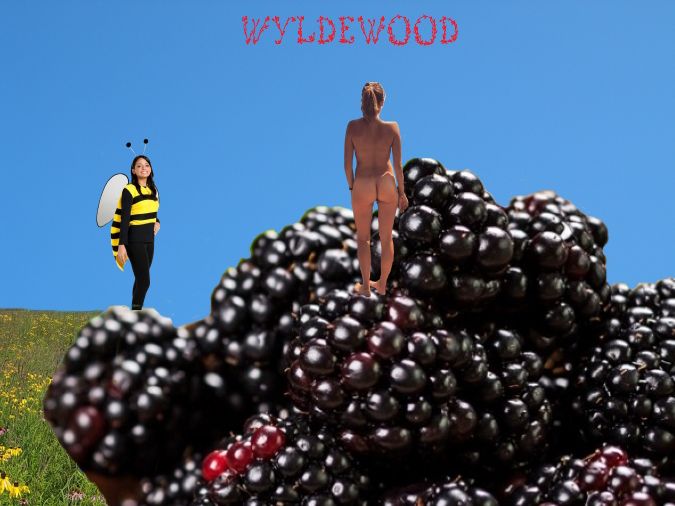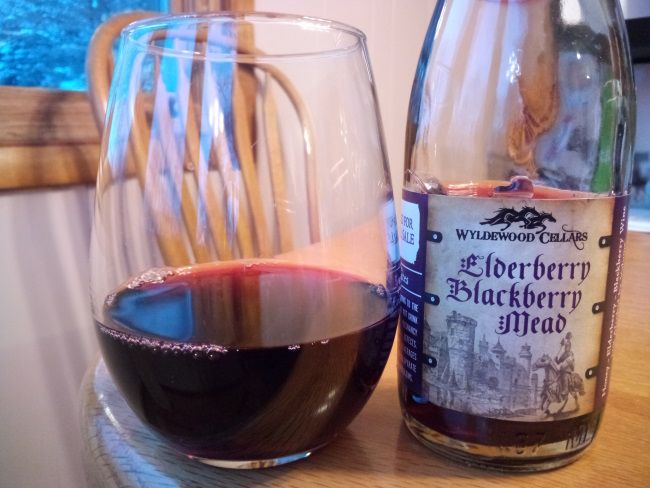When I was composing my previous elderberry mead review, I wrote under the impression that elderberries were on the obscure side of things, that the folks at Wyldewood Cellars were nearly alone in their love of the fruit of the elder plant and that, for most, they were simply something mentioned in a Monty Python movie.
One day after having posted that review, I was poking around my refrigerator for some sport peppers because I was in the middle of a Chicago dog marathon when I came across a bottle of elderberry tincture or some such thing. It reminded me of my impression that elderberry juice was de rigueur in natural health circles. It may not be, but it seems fairly common to me, at least, with multiple people I know taking it whereas it was nowhere to be seen a few years back.
It also occurred to me that elderflower liqueur was trendy. (I believe we have a bottle of St. Germaine that my wife bought in the liquor cabinet.) Although I am not a big cocktail drinker, I've heard tell of tasty concoctions that have elderflower liqueur in them from some folks who frequent bars that have a cocktail menu that reaches beyond Old Fashioneds and rum & coke. Plus I've seen articles about craft cocktails that mention it in local publications.
I then discovered the existence of the Midwest Elderberry Cooperative, a group that promotes the growing and selling of elderberries. Although the coop is out of Minnesota, it seems that there are some Wisconsin members. The coop notes, "Over 95% of the elder ingredients found in American made products are sourced from outside our continent."
In addition to touting the elderberry's taste and health benefits, they also promote the environmental benefits: "Perennial native elderberry supports over 60 native pollinators, holds soils in place, sequesters carbon and sucks up nitrogen." My guess is that these qualities are basically the exact opposite ones of corn and soy beans, the biggest crops in this country.
It appears that the humble elderberry isn't quite obscure as I had thought initially.
Joining it here are blackberries. Along with raspberries, they are the main members of the caneberry family. I see here that cloudberries are also part of the family and my wife came back with a jar of cloudberry jam on a recent trip to Ikea. In a blind taste test, I think I'd be hard pressed to distinguish between a blackberry and a raspberry. To my mind blackberries are sweeter and less tart than raspberries. And I have just began my investigation of the cloudberry.
I'd be unable to distinguish the colors of plain elderberry mead and this elderberry-blackberry combo stuff even if I had a really detailed Pantone swatch book that was the OED of colors. They looked indistinguishable. Still, they also both looked lovely having a deep ruby hue. It was clear and had no fizz. The aroma was much the same as well. It smelled like berries along with a large dose of honeyed sweetness and that same vinous scent.
(I should make things easy for myself and just do some cutting and pasting here.)
The mead tasted smooth with a heavy body full of sugars as it was very sweet. Again, the honey had a prominent floral taste to it and less earthy. That vinous thing was present in the taste as was a nice tartness. I think this stuff was a little less tart than the mead made from elderberries alone. Not dramatically but noticeably.
I found that the honey-berry sweetness lingered after swallowing and the tannins took a little while to kick in and add moderate dryness.
I greatly enjoyed this mead as I did the version without the blackberries. The differences are subtle with the main one being that this stuff is a tad less tart. As I noted last time, I prefer dry mead but Wyldewood has a knack for using tart fruits to keep high doses of sweetness from being overly cloying.
Junk food pairing: To honor the coming together of two berries here, pair this mead with Lay's Funyuns Potato Chips which bring together two vegetables dug up from the soil.


No comments:
Post a Comment